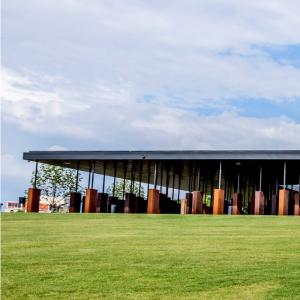
Josina Guess is an editor, writer, mother, farmer, and community organizer based near Athens, Ga. She writes at the intersection of ecology, race, history, and faith. She was born in rural Alabama and educated in Washington, D.C., public schools. While growing up in D.C., she and her family attended New Community Church in the Shaw neighborhood. As a young adult, she was a member of Woodland Presbyterian Church in Philadelphia where she served as director of children, youth, and family ministries and was trained in Godly Play. She is an active member of the Comer Quaker Meeting of Southeastern Yearly Meeting.
Before joining Sojourners staff, Josina was a senior writer and managing editor for The Bitter Southerner. She has written for Atlanta Magazine, Oxford American, Ecotone, Fourth Genre, About Place Journal, Christian Century and the anthologies Bigger Than Bravery: Black Resilience and Reclamation in a Time of Pandemic edited by the late Valerie Boyd (Lookout Books, 2022), Rally: Communal Prayers for Lovers of Jesus and Justice, edited by Britney Winn Lee (Upper Room Books 2020), Wisdom of Communities: Volume 4 – Sustainability in Community: Resources and Stories about Creating Eco-Resilience in Intentional Community edited by Chris Roth (Fellowship for Intentional Community 2018), and Fight Evil With Poetry edited by Chris Campbell and Micah Bournes (Sideshow Media Group 2018).
Along with her husband, Michael, and their four children, Josina lived and worked for six years at Jubilee Partners, a Christian hospitality community in rural Georgia. She is a contributor to the "Refugees in Georgia Oral History Project" for the Russell Library at the University of Georgia and a 2018 recipient of a Louisville Institute PSP Grant. She honed her writing and editing skills at workshops at the Collegeville Institute for Ecumenical Research.
Josina graduated from Earlham College in Richmond, Ind., with a B.A. in art concentrating in ceramics. She earned a Master of Fine Arts in narrative nonfiction from the College of Journalism and Mass Communication at the University of Georgia. She loves singing, cooking, gardening, making goat cheese, and walking to the river with her family, dogs, and goats.
Posts By This Author
Why I Brought My Children to the Montgomery Legacy Museum
MY THROAT STARTED to feel tight a few days before I went to Montgomery this April. I had been planning this pilgrimage to Alabama with my teen children for months but, as the days grew closer, I questioned my body’s ability to walk into the grief that was awaiting us at the Legacy Museum and National Memorial for Peace and Justice.
As a biracial African-American woman putting down roots in the rural South with my white husband and our four children, daily life can feel like an act of resistance. Every day we are faced with Confederate flags and memorials that celebrate an era and mindset that would have made our marriage and my equal ownership of our property a crime. But we love our home, the land, and our neighbors. We want, in the words of Gwendolyn Brooks, “to conduct [our] blooming in the noise and whip of the whirlwind.”
I was determined to bring my older children to the state of my birth, to take an unflinching look at our racist past and present, and to give them courage to walk the unfinished path toward justice. But still, I found it hard to breathe.
I gardened with a single-minded ferocity in the days before our trip, pulling weeds and digging up long taproots as though I could purge the evils from our land with my bare hands. Red dirt began to lodge deep beneath my nails and in the dry creases of my fingers, my forearms bore slashes from the thorny vines that whipped me as I tore them from the earth. There were flowers, thick with the hopeful scent of spring, trying to bloom beneath the tangle of weeds. I yanked and tore in every spare minute I had, stopping only when I noticed blood pouring from a deep slice on my right forefinger.
It felt right to come with dirty, bloodied hands into those sacred spaces in Montgomery.
